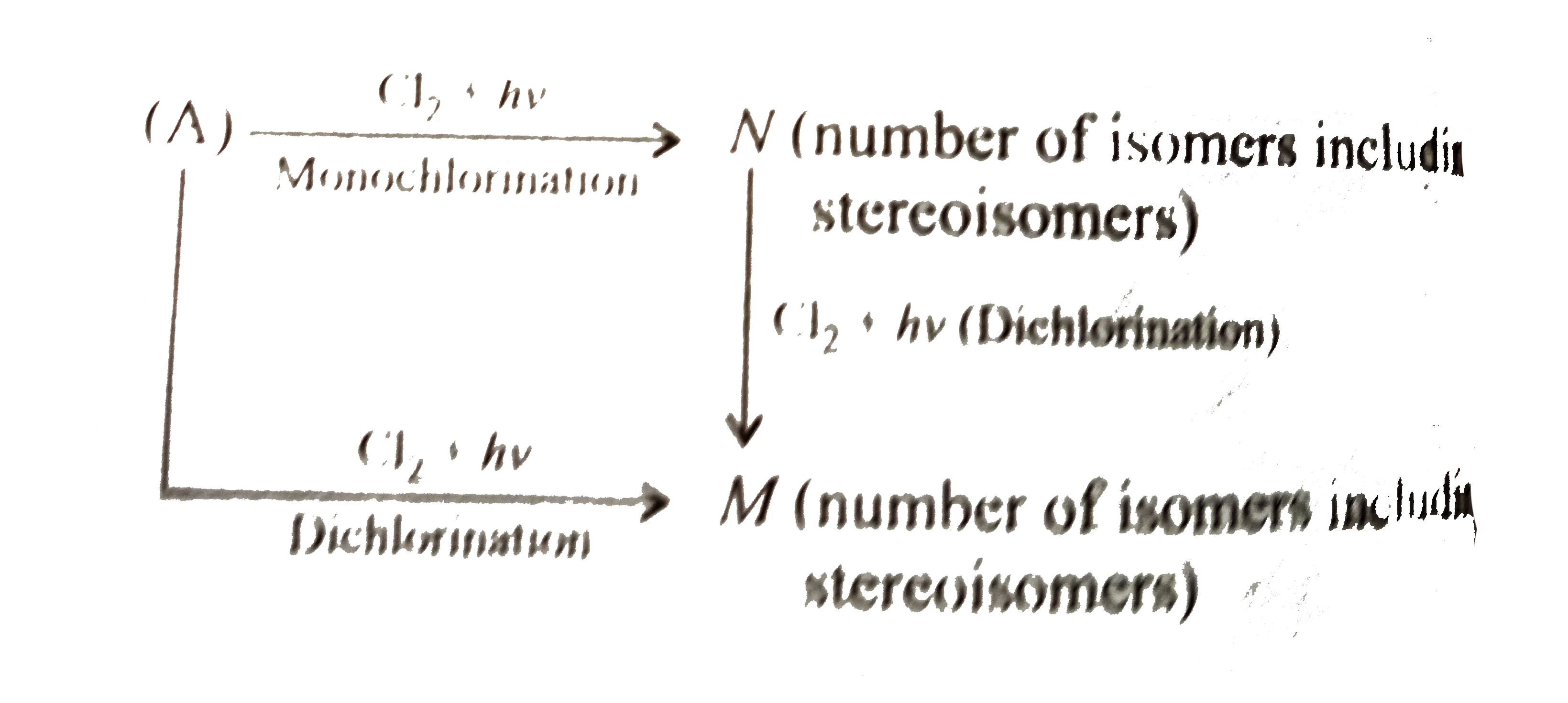A gaseous hydrocarbon on analysis gave the following data :
(i) It contains C = 82.7% and H = 17.3%
(ii) The mass of 132 mL (measured at S.T.R) of it is 0.342 g.
Find the molecular formula of the hydrocarbon.
To find the molecular formula of the hydrocarbon based on the given data, we can follow these steps:
Step 1: Calculate the molar mass of the hydrocarbon using the given volume and mass.
We know that 1 mole of gas at Standard Temperature and Pressure (S.T.P) occupies 22.4 liters (or 22400 mL).
Given:
- Volume of gas = 132 mL
- Mass of gas = 0.342 g
First, we need to find the mass of 1 mole of the hydrocarbon:
Mass of 1 mole=Mass of gasVolume of gas (in liters)×Volume of 1 mole (in liters)
Mass of 1 mole=0.342 g0.132 L×22.4 L=0.342×22.40.132≈62.18 g/mol
Step 2: Determine the empirical formula from the percentage composition.
Given:
- C = 82.7%
- H = 17.3%
To find the moles of each element in 100 g of the compound:
Moles of C=82.7 g12 g/mol≈6.89 moles
Moles of H=17.3 g1 g/mol≈17.3 moles
Step 3: Find the simplest mole ratio.
Now, we will divide the number of moles of each element by the smallest number of moles calculated:
Ratio of C=6.896.89=1
Ratio of H=17.36.89≈2.5
This gives us a ratio of C:H = 1:2.5.
Step 4: Convert the ratio to whole numbers.
To convert the ratio to whole numbers, we can multiply both sides by 2:
C:H=1×2:2.5×2=2:5
Thus, the empirical formula is C2H5.
Step 5: Calculate the empirical formula mass.
The empirical formula mass can be calculated as follows:
Empirical formula mass=(2×12)+(5×1)=24+5=29 g/mol
Step 6: Find the molecular formula.
Now, we can find the molecular formula by dividing the molar mass by the empirical formula mass:
n=Molar massEmpirical formula mass=62.1829≈2.14≈2
Thus, the molecular formula is:
Molecular formula=n×Empirical formula=2×C2H5=C4H10
Final Answer:
The molecular formula of the hydrocarbon is C4H10.
---
We know that 1 mole of gas at Standard Temperature and Pressure (S.T.P) occupies 22.4 liters (or 22400 mL).
- Volume of gas = 132 mL
- Mass of gas = 0.342 g
Given:
- C = 82.7%
- H = 17.3%
Now, we will divide the number of moles of each element by the smallest number of moles calculated:
To convert the ratio to whole numbers, we can multiply both sides by 2:
The empirical formula mass can be calculated as follows:
Now, we can find the molecular formula by dividing the molar mass by the empirical formula mass:
The molecular formula of the hydrocarbon is C4H10.
Topper's Solved these Questions
- SOME BASIC CONCEPTS OF CHEMISTRY BOOK - ICSECHAPTER - SOME BASIC CONCEPTS OF CHEMISTRY EXERCISE - REVIEW EXERCISES
129 Videos
- SOME BASIC CONCEPTS OF CHEMISTRY BOOK - ICSECHAPTER - SOME BASIC CONCEPTS OF CHEMISTRY EXERCISE - VERY SHORT ANSWER TYPE QUESTIONS
34 Videos
- SELF ASSESSMENT PAPER 2BOOK - ICSECHAPTER - SELF ASSESSMENT PAPER 2EXERCISE - Questions
62 Videos
- SOME P-BLOCK ELEMENTS BOOK - ICSECHAPTER - SOME P-BLOCK ELEMENTS EXERCISE - NCERT TEXTBOOK EXERCISES (With Hints and Solutions)
63 Videos
Similar Questions
A hydrocarbon contains 91.3% carbon by mass. Find the empirical formula of hydrocarbon?
View SolutionFifteen milliliters of gaseous hydrocarbo (A) was required for complete combustion 357 ml of air (21 % oxygen by volume) and gaseous products occupied 327 ml (all volumes being measured at STP).

The molecular formula of the hydrocarbon (A) is:
View Solution15 " mL of " a gaseous hydrocarbon A requried for complete combustion. 357 " mL of " air (21% oxygen by volume) and gaseous products occupied 327 mL (all volumes being measured at STP. The molecular formula of the hydrocarbon A is
(a). C2H6
(b). C2H4
(c). C3H6
(d). C3H6
View SolutionAn organic compound on analysis gave the following data C=53.33%,H=15.56%,N=31.11%. Its empirical formula is
View SolutionA hydrocarbon contains 85.7% carbon. If 42 mg of the compound contain 3.01×1020 molecules, find the molecular formula of the compound.
View SolutionA compound contains 25.52% C, 6.38% H and 68.1% S by mass. If the molecular mass of the compound is 94, determine its molecular formula.
View SolutionAn organic compound contains C = 16.27%, H = 0.677%, CI = 72.2% and O=10.8%. Its molecular mass is 147.5 amu. Find its molecular formula.
View Solution448 mL of a hydrocarbon, having C = 87.8%, H = 12.19%, weigh 1.64 g at S.T.P Determine the molecular formula of the compound.
View SolutionA crystalline compound when heated became anhydrous by losing 51.2 % of the mass. On analysis, the anhydrous compound gave the following percentage composition: Mg = 20.0 %, S = 26.66 % and O = 53.33 %, Calculate the molecular formula of the anhydrous compound and crystalline compound. The molecular mass of anhydrous compound is 120 u.
View SolutionA volatile organic compound contains 10% C, 0.84%H and 89.12% Cl. In Victor Meyer's method, 0.6 g of the substance displaced 112 mL of air at S.T.P. Find out the molecular formula of the compound.
View Solution
